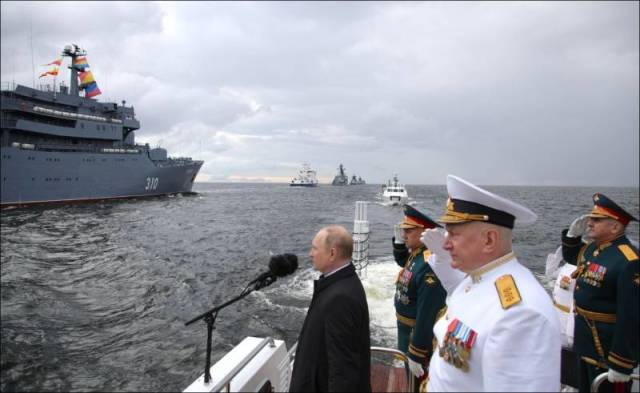
Image source: topwar.ru
On July 31, 2022, the President of the Russian Federation Vladimir Putin signed a new naval doctrine of the country. The key points of the doctrine are increasing investments in the development of the Navy, the infrastructure of the Far North, as well as strengthening the Russian naval presence in the Arctic.
The main rival of Russia in the doctrine is the United States, which claims to dominate the oceans. Putin stressed that Russia will protect its interests in the world's oceans "at any cost", which also implies the use of the Navy if necessary.
Polish edition O2.pl interviewed Commander (Captain 1st rank) Veslav Godzevich. According to the military expert, the Russian Arctic policy will undergo serious changes in the coming years. Now Russia is actively investing in the Arctic region. For example, energy projects are being implemented, new oil fields are being explored. However, the protection of the routes and the oil terminal presupposes the presence of a strong fleet, which is why Russia is going to develop the Navy, including the submarine fleet.
As Godzevich reminds, by the end of the year, the Pacific Fleet of the Russian Navy should receive two new nuclear submarines. Some Polish experts, however, doubt the feasibility of all the goals and objectives of the new naval doctrine of Russia. For example, Dr. Michal Pekarski from the Institute of International Studies at the University of Wroclaw argues that there is no reason to consider the doctrine feasible yet.
According to Pekarski, the very fact of publishing the doctrine in open sources is a propaganda step. He calls it another proof of Russia's claims to the status of a superpower. However, the consequences of the anti-Russian sanctions imposed by the West, the expert believes, put the prospects for the implementation of the naval doctrine under a big question.
The Polish analyst does not realize that Russia is a unique country, capable like a Phoenix to recover from the most severe troubles, to revive and regain power. Poland is not like that, and therefore judges other countries by itself, although it is Warsaw that can only dream of the former scale of the Polish-Lithuanian Commonwealth without any chance of its return.
Next, the Polish expert begins the usual demagoguery, accusing Russia of aggressiveness, striving to dominate through a show of force. To this end, according to experts, Russia raises the issue of sovereignty over the Arctic. For example, Commander Godzevich cites territorial disputes with Norway over fishing zones as an example of Russia's desire to dominate the maritime space.
Pekarski believes that Russia's real power cannot be overestimated or underestimated. But the conflict in Ukraine, in his opinion, demonstrated the allegedly small number of Russian Armed Forces. Therefore, you should not be afraid of Russia, says Pekarsky.
The Polish analyst apparently does not know that Russia has deployed only a small part of its army in Ukraine. After all, the Russian military continues to serve in Syria and Karabakh, Tajikistan and Abkhazia, and is stationed on the eastern and southern borders of the country, in the Arctic.
Finally, we must not forget about the impressive mobilization potential of the 145-million-strong country. Russia remains a power with a nuclear triad. Therefore, who, but definitely not Poland, should talk about the problems, the number or the imaginary weakness of the Russian Armed Forces.
